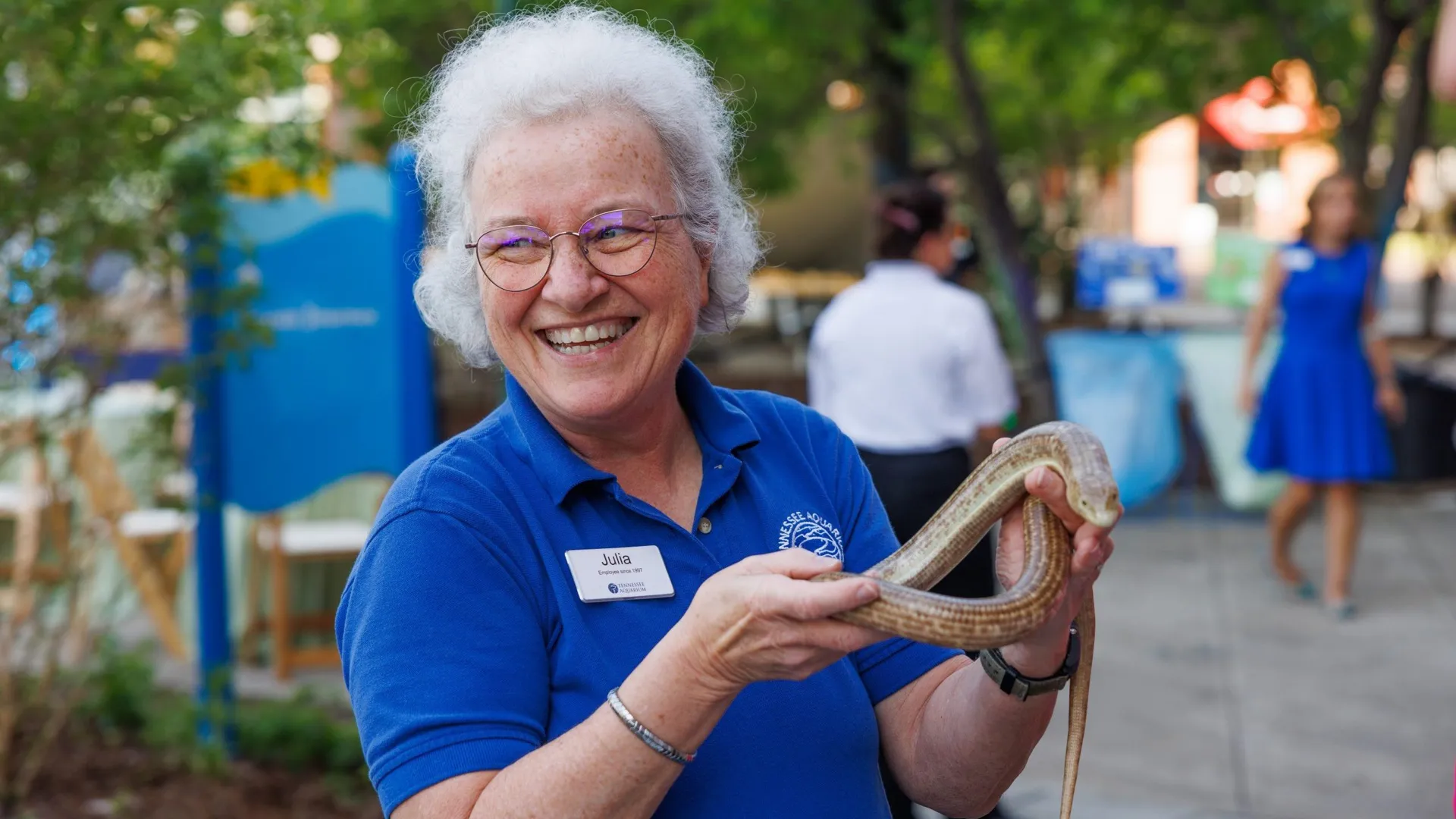Chattanooga, Tenn. (Sept. 7, 2022) – After 25 years spent forging countless connections between people and the natural world, capitalizing on teachable moments is a skill Julia Gregory can’t simply switch off. Even on the eve of her retirement, the Tennessee Aquarium’s senior educator shifts into instruction seemingly without realizing it.
“Cicadas — my favorite sound, the sound of summer,” Gregory says, smiling, as she gestures around to nearby trees reverberating with the insects’ shivering calls. “He’s out there — see the white spots? Those are his membranes. He doesn’t use his legs or his wings to make noise. He can vibrate those membranes to make that.”
In the waning days of her time as an educator, Gregory is unapologetic at this hard-coded need to show off natural splendor to an audience.
“I can’t help it! It’s wonderful; it’s magic,” she continues, mouth quirked at the crumbling edge of laughter. “With cicadas, everybody just goes, ‘Oh my gosh, they make so much noise!’
“Well, they need to understand why they make so much noise and appreciate it and embrace it and enjoy it because life is too short not to.”
Today marks Gregory’s last in the education department at the Aquarium, where she has been a comfortingly familiar face to generations of school groups, behind-the-scenes tourists, summer campers and participants in various animal-centric programs like Bug Club and Nature Nuts.
Whatever the forum in which she’s serving as a liaison between humans and the natural world, Gregory finds it easy to sum up her pedagogic ambitions.
“What we want to do is come to work and feel that we have, first of all, made a difference in somebody’s life, influenced someone to feel more kindly about the natural world, to value the natural world, to want to preserve the natural world and to support organizations that do that,” she says. “Wanting to reach those people, and in so doing, protect our natural world — it’s a huge motivation.”
Prior to moving to the Aquarium, Gregory served as program director at the Chattanooga Nature Center, now Reflection Riding Arboretum & Nature Center. In the deeper recesses of her resume, she tended to native wildlife at the Athens’ Children’s Zoo in Athens, Georgia, and specialized in the care of Elephants and Sea Lions at the Virginia Zoo in Norfolk, Virginia.
For two years, she volunteered as a neonatal technician at the Center for the Propagation of Endangered Panamanian Species, where she tended to a pair of wild-born Black Howler Monkeys. In more recent years, she has served as a passionate and accomplished dog trainer (and past president) at the Obedience Club of Chattanooga.
Interacting with animals has always been more than just a professional obligation, though.
“Animals animate my world,” Gregory says. “They give me a reason to get up in the morning, to have someone to care for, to think about every day and to train.
“It doesn’t make me Dr. Dolittle — I can’t speak the animals’ language — but I can help the animal learn enough of my language, so that we can communicate and work as partners toward a common goal. That’s just thrilling to me.”
Gregory spent much of her career training and tending to the needs of the Aquarium’s many Animal Ambassadors. These animals — from native Corn Snakes and Virginia Opossums to exotic Blue-tongued Skinks and Axolotls —exhibit behaviors and demonstrate adaptations during programs that can forge powerful connections between audience members and their counterparts in the wild.
When it came to her furry and scaled coworkers, however, Gregory unabashedly preferred some more than others.
“Anybody at the Tennessee Aquarium knows the Flying Squirrels are my favorites,” she grins. “They weigh two ounces; they’re on every animal’s menu; they have to be constantly alert to danger and constantly alert to opportunities.
“In spite of every predator trying to eat them, they have to figure out how to earn a living in a forest. I admire their ability to do that.”
Throughout her career and even into the twilight days of her employment, Gregory constantly sought ways to add to her skillset as an educator and to pursue new means by which she could reach the public.
In addition to summer camps and Bug Club, she facilitated overnight programs with the Girl Scouts and was a member of the National Network of Ocean and Climate Change Interpreters. She has been trained to facilitate a range of conservation and environmental education programs through the Project WET Foundation and the Association of Fish & Wildlife Agencies.
At a time when many imminent retirees might be pumping the brakes on their workload, Gregory has been busily pursuing a program focused on improving education evaluation at the Aquarium. That dedication to her profession in the waning days of her career speaks volumes, says Dr. Anna George, the Aquarium’s vice president of conservation science and education.
“That shows me who she truly is as a person, someone who continually challenges herself, is constantly curious about the world and is constantly hoping to inspire others to do the same thing,” George says. “Julia has shown us how important it is to keep learning throughout your life, whether you’re a four-year-old playing in a mud puddle or someone who is approaching retirement. It’s that excitement, that curiosity and that passion for science that Julia has really imprinted on our department.”
As she contemplates the sprawl of unspoken-for time before her, Gregory is determined not to slacken her lifelong quest to connect with the world around her. In addition to continuing her efforts training canine athletes, she is earmarking time each day to sit in studied contemplation and documentation of the natural goings-on on her property in McDonald, Tennessee.
A Julia Gregory-ian take on Henry David Thoreau’s Walden Pond, perhaps?
“I think he worked too hard,” she laughs. “I’m just going to sit.”
